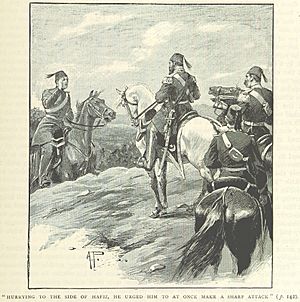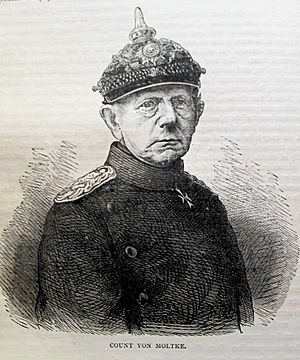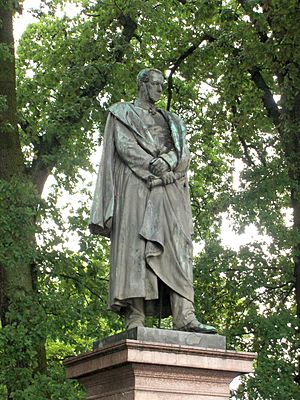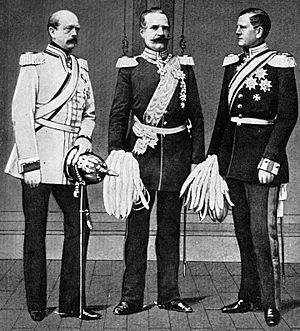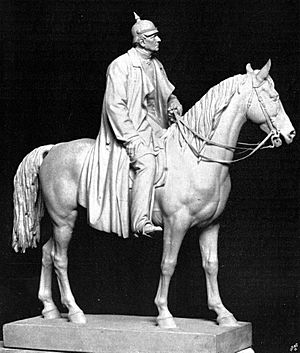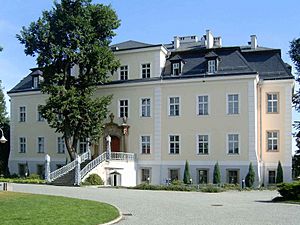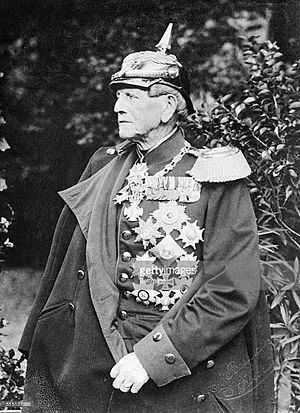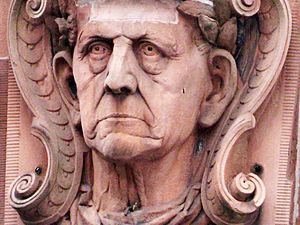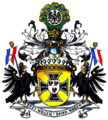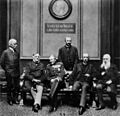Helmuth von Moltke the Elder facts for kids
Quick facts for kids
Graf
Helmuth von Moltke
the Elder
|
|
|---|---|
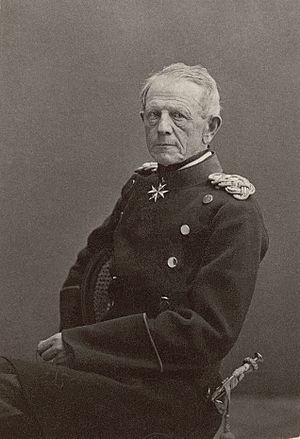
Helmuth von Moltke, c. 1870s
|
|
| Chief of the German General Staff | |
| In office 18 January 1871 – 10 August 1888 |
|
| Monarch | |
| Chancellor | Otto von Bismarck |
| Preceded by | Position established |
| Succeeded by | Alfred von Waldersee |
| Personal details | |
| Born | 26 October 1800 Parchim, Mecklenburg-Schwerin, Holy Roman Empire |
| Died | 24 April 1891 (aged 90) Berlin, Prussia, German Empire |
| Spouse |
Mary von Burt
(m. 1842; died 1868) |
| Relatives | Helmuth von Moltke the Younger (nephew) |
| Signature | |
| Nicknames | Moltke the Elder (Moltke der Ältere) The Great Taciturn (Der große Schweiger) |
| Military service | |
| Allegiance | |
| Branch/service | |
| Years of service | 1819–88 |
| Rank | Second lieutenant (Danish Army) |
| Battles/wars | Battle of Nezib Second Schleswig War Austro-Prussian War Franco-Prussian War |
| Awards | see below |
Helmuth Karl Bernhard Graf von Moltke (born October 26, 1800 – died April 24, 1891) was a very important military leader from Prussia (a powerful German kingdom). He was a field marshal, which is a very high army rank. For 30 years, he was the chief of staff for the Prussian Army. He is known for creating new, modern ways to lead armies in battles. Many people think he was one of the smartest military minds of his time.
Moltke led troops in Europe and the Middle East. He played a key role in three major wars: the Second Schleswig War, the Austro-Prussian War, and the Franco-Prussian War. He was also very interested in railways and was one of the first to see how useful they could be for moving soldiers and supplies. He is often called Moltke the Elder to tell him apart from his nephew, Helmuth von Moltke the Younger, who led the German Army at the start of World War I.
Contents
Early Life and Training
Moltke was born in Parchim, a town in what is now Germany. His father was a German general serving in the Danish army. When Moltke was young, his family lost most of their money because of a war.
At age 12, he went to a military school in Copenhagen, Denmark. He joined the Danish army as a second lieutenant in 1818. But when he was 21, he decided to join the Prussian army instead. In 1822, he became a second lieutenant in a Prussian infantry regiment. He then studied for three years at the Prussian Military Academy, finishing in 1826.
Military Career Highlights
Starting as a Young Officer
After military school, Moltke taught at a cadet school for a year. Then, for three years, he worked on military surveys in different parts of Prussia. In 1832, he joined the general staff in Berlin. His leaders, including Prince William (who later became emperor), thought he was a very smart officer.
Moltke enjoyed reading and writing. He wrote a short story and essays about history and geography. He even tried to translate a long history book from English to German to earn money for a horse!
Serving the Ottoman Empire
In 1835, Moltke, now a captain, got permission to travel in Southeast Europe. While in Constantinople (modern-day Istanbul), the Sultan Mahmud II asked him to help make the Ottoman Empire's army more modern. Moltke agreed and stayed for two years. He learned Turkish and mapped important areas like Constantinople and the Bosphorus.
In 1838, Moltke became an adviser to an Ottoman general fighting against Muhammad Ali of Egypt. Moltke explored the area and made many maps. However, in the Battle of Nezib in 1839, the Ottoman army lost because the general didn't listen to Moltke's advice. Moltke returned to Berlin in poor health but was given an important award, the Pour le Mérite.
Back home, he published a book about his time in Turkey. In 1842, he married Mary von Burt, an English woman. They were very happy together, but they didn't have children. Moltke also became very interested in railroads. He realized how useful they could be for moving soldiers and supplies quickly. He even invested his own money in railway companies. Later, he created a special department in the army just for managing military use of railways.
Leading the Prussian General Staff
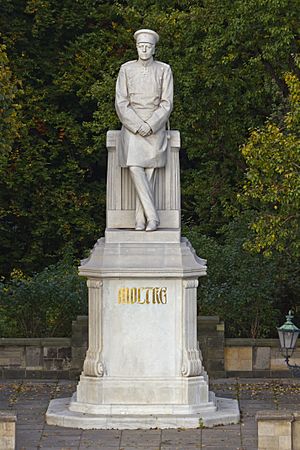
In 1857, Moltke was chosen to be the Chief of the Prussian General Staff. This was a very important job, like being the head planner for the entire army. He held this position for 30 years. He quickly started making big changes to how the Prussian army planned its strategies and battles. He improved weapons, communication, and how staff officers were trained. He also made sure the army studied European politics to prepare for future wars. By 1860, his changes had made the Prussian army much more modern and effective.
The War with Denmark (1864)
When the Second Schleswig War against Denmark started in 1864, Moltke was initially kept in Berlin. His first plan for the war was not followed correctly, and the Danish army managed to escape to islands. This made it hard to end the war.
However, on April 30, 1864, Moltke was sent to lead the staff for the German forces. He quickly came up with a new plan to capture the Danish islands. His plan worked! On June 29, Prussian soldiers crossed a strait in boats, landed under fire, and took over the island of Als. This victory helped end the war, and Denmark was defeated.
Moltke's Ideas on War Strategy
Moltke had very modern ideas about war. He believed that strategy was a practical art, not just a set of strict rules. He understood that new weapons made it harder to attack an enemy head-on. Instead, he thought it was better to attack the enemy from the sides, surrounding them.
He also realized that armies had become so big that one commander couldn't control every single soldier. So, he believed that different parts of the army should be able to act on their own, using their own judgment, as long as they followed the main goal. This idea, called "mission-type tactics," meant that commanders were given a goal, not a step-by-step plan. This became a key part of German military thinking.
Moltke famously said, "No plan of operations extends with certainty beyond the first encounter with the enemy's main strength." This means that once a battle starts, things rarely go exactly as planned. So, he believed military leaders should prepare for all possible situations.
The Austro-Prussian War (1866)
Moltke planned and led the military operations during the Austro-Prussian War of 1866. Prussia was fighting against Austria and its German allies. Moltke made sure the Prussian army was ready first, using railways to move soldiers quickly.
He divided the Prussian army into three main groups. His plan was to bring these groups together to trap the Austrian army. Even though the Austrian army moved faster than he expected, Moltke's careful planning and the independent actions of his commanders led to a great victory.
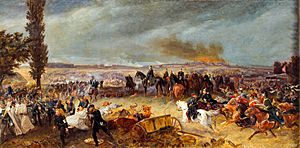
The most important battle was the Battle of Königgrätz. Moltke's two armies attacked the Austrians from different sides, completely defeating them. This victory ended the war quickly. After the war, Moltke was given a large sum of money, which he used to buy an estate called Creisau.
The Franco-Prussian War (1870–71)
Moltke again planned and led the Prussian armies in the Franco-Prussian War (1870–71). He had been preparing for a war with France for many years, constantly updating his plans for moving the army by railway.
When the war started, Moltke's plans were followed without question. He was made Chief of Staff of the Army for the war, which meant his orders were almost like royal commands. His plan was to gather the German army south of Mainz. He expected the French army to gather near Metz and Strasbourg.
Moltke's main idea was to attack the French army in a way that would push them north and cut them off from Paris. This plan worked very well. Even though some battles happened earlier than he planned, Moltke adjusted quickly. The Battle of Gravelotte trapped a large French army in the fortress of Metz.
Then, Moltke moved his armies towards Paris. When he learned that another French army was trying to rescue the trapped soldiers, he quickly changed his army's direction. This led to the Battle of Sedan, where the German armies completely surrounded the French army. On September 1, 1870, the French army was forced to surrender.
After this huge victory, Moltke continued the advance on Paris, surrounding the city. The war ended in January 1871 with an armistice, and the German Empire was created.
Later Life and Legacy
In October 1870, Moltke was given the noble title of Graf (count) for his great service in the Franco-Prussian War. In 1871, he was promoted to field marshal and received more money. He also became a member of the German parliament, the Reichstag, where he spoke about military matters.
Moltke oversaw the writing of the official history of the Franco-Prussian War. After the war, he became a national hero in Germany. Many monuments were built in his honor.
Moltke retired in 1888. His nephew, Helmuth Johann Ludwig von Moltke, later became chief of staff as well. Field Marshal Helmuth von Moltke died in Berlin on April 24, 1891, at the age of 90. He received a state funeral, with thousands of soldiers and the Kaiser (Emperor) attending. His body was buried in the family mausoleum on his estate.
Personal Life
Moltke was married to Mary von Burt from 1842 until her death in 1868. He loved his wife very much. Even after she passed away, he would visit the chapel where she was buried every day to think about her.
A Voice from the Past
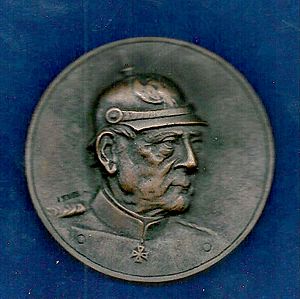
In 1889, Moltke made two special audio recordings using a new invention called the cylinder phonograph. He recorded lines from famous plays by Shakespeare and Goethe. These recordings were lost for a long time but were found and identified in 2012. They are very special because they are the only known voice recordings of someone born in the 1700s!
Dates of Rank
Moltke rose through the military ranks during his long career:
- 1819: Second Lieutenant (Danish Army)
- 1822: Second Lieutenant (Prussian Army)
- 1833: First Lieutenant
- 1835: Captain
- 1842: Major
- 1850: Lieutenant Colonel
- 1851: Colonel
- 1856: Major General
- 1859: Lieutenant General
- 1866: General of Infantry
- 1871: General Field Marshal
Honors and Awards
Moltke received many honors and awards for his military achievements:
- Granted the noble title of Count (Graf), October 1870
- Honorary Citizen of the City of Hamburg, 1871
- German awards
- Pour le Mérite, 1839 (military); 1874 (civil)
- Royal Crown Order, 1st Class with Swords, 1864
- Order of the Black Eagle, 1866 (highest Prussian order)
- Grand Cross of the Red Eagle, 1866
- Grand Cross of the Iron Cross, 1871
- Grand Commander's Cross of the Royal House Order of Hohenzollern, 1875
- Foreign awards
- Grand Cross of the Imperial Order of Leopold (Austria), 1864
- Grand Cross of the Royal Hungarian Order of St. Stephen, 1872
- Grand Cordon of the Order of Leopold (Belgium), 1867
- Grand Cross of the Military Order of Savoy (Italy), 1867
- Knight of the Annunciation (Italy), 1873
- Knight of St. Alexander Nevsky (Russia), 1867
- Knight of St. George, 2nd Class (Russia), 1870
- Knight of St. Andrew (Russia), 1871 (highest Russian order)
- Grand Cross of the Legion of Honour (France), 1867
- Grand Cross of the Tower and Sword (Portugal)
- Order of Distinction (Ottoman Empire)
- Order of the Medjidie, 1st Class (Ottoman Empire)
- Grand Cross of the White Elephant (Siam)
- Knight of the Seraphim (Sweden-Norway), 1881
Images for kids
See also
 In Spanish: Helmuth Karl Bernhard von Moltke para niños
In Spanish: Helmuth Karl Bernhard von Moltke para niños
- Fort Rapp
Primary sources
- Wilkinson, Spenser (ed.). Moltke's Military Correspondence, 1870–71, Ashgate, 1991. ISBN: 0-7512-0040-9
- Letters of Field-Marshal Count Helmuth von Moltke to his mother and his brothers: Translated by Clara Bell and Henry W. Fischer (1891)
- Letters of Field-Marshal Count Helmuth von Moltke to his mother and his brothers (1892)
- Essays, speeches, and memoirs of Field Marshal Count Helmuth von Moltke (1893)
 | Emma Amos |
 | Edward Mitchell Bannister |
 | Larry D. Alexander |
 | Ernie Barnes |


